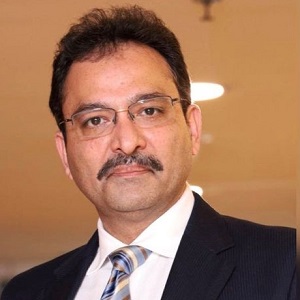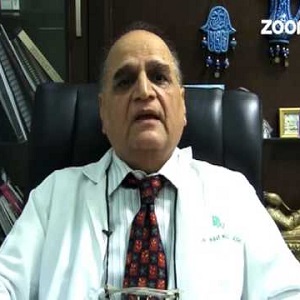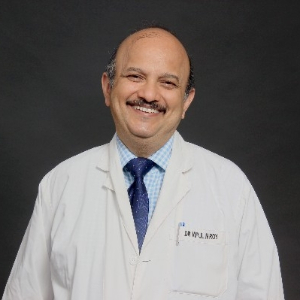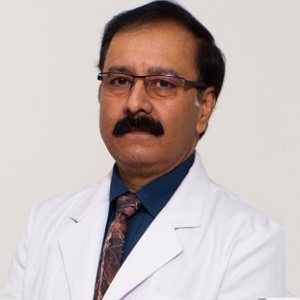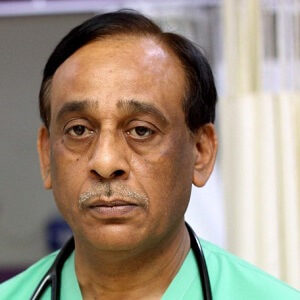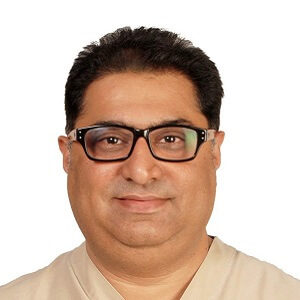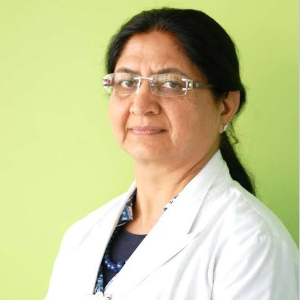Best Doctors in India for Alcoholic Hepatitis Treatment
- Bariatric & Laparoscopic Surgeon, New Delhi, India
- Over 25 years’ experience
Profile Highlights:
- Dr. Manish Baijal is an experienced, proficient, and renowned Bariatric Surgeon and the credit for doing scarless neck surgery for Thyroid and Para Thyroid Diseases for the first time goes to him.
- He also performs surgery for Morbid Obesity (Weight Loss) and Metabolic Disorders (Bariatric Surgery) with much dexterity.
- He has acquired great fame for performing surgery on abdominal Wall Hernias. Besides these, he also does Biliary surgeries like Gall Bladder Stone, Common Bile Duct Surgery, etc.
- Dermatologist, New Delhi, India
- Over 48 years’ experience
Profile Highlights:
- Dr. Ravi K Joshi is an expert dermatologist who has over 48 years of experience in this field.
- Dr. Joshi is proficient in treating chemical peel and pigmented papillomas on the face.
- Interventional Cardiologist, New Delhi, India
- Over 30 years’ experience
Profile Highlights:
- Dr. Vipul Roy is one of the best practicing Cardiologists in India, currently associated with the Indraprastha Apollo Hospital in New Delhi.
- After completing his MD, Dr. Roy travelled to UK where he spent eight years in Liverpool at Regional Adult Cardiothoracic Center.
- In 1994, he came back to India and joined Interventional Cardiology at Escorts Heart Institute in New Delhi as a consultant.
- Endocrinologist & Diabetologist, Gurugram, India
- Over 35 years’ experience
Profile Highlights:
- Dr. Atul Luthra is a senior consultant in the arena of diabetes and other endocrine disorders.
- He is an excellent teacher and author. He is widely known for delivering guest lectures at various state and national level conferences.
- Dr. Luthra is a prolific speaker and orator, who has a special contribution to diabetes outreach in India.
- Pediatric Cardiologist, New Delhi, India
- Over 26 years’ experience
Profile Highlights:
- Dr. Ashutosh Marwah is one of the best child heart specialists in India, having experience of over 26 years.
- He was the former Assistant Director of Jaypee Hospital and is now practicing at Indraprastha Apollo Hospital in New Delhi.
- Dr. Ashutosh Marwah has expertise in treating complex cardiac defects, Interventional & perioperative cardiac catheterizations, dilatation stenting, fetal echocardiography, Aortic Aneurysm, and Stent implantation.
- He has Fellowships in Pediatric Cardiology from reputed hospitals like Escorts Heart Institute, Delhi, and Royal Children’s Hospital, Melbourne, improvised his skills.
- Dr. Marwah published multiple research papers and articles in reputed medical journals of India and abroad. He is also a member of the Lions Club of Dar Es Salaam.
- Interventional Cardiologist, New Delhi, India
- Over 36 years experience
Profile Highlights:
- Dr. K K Saxena is one of the top cardiologists in India, having nearly 36 years of experience in this field.
- He is a senior consultant for interventional cardiology at Indraprastha Apollo Hospital in New Delhi.
- Dr. Saxena diagnoses and treats cardiovascular problems in kids and adults. He is specialized in balloon dilation of the mitral and pulmonary valves, the renal and peripheral arteries, and aortic coarctation.
- Dr. Saxena and his team performed several cardiac catheterizations and pacemaker implantations.
- Prior to joining Apollo hospital, Dr. K K Saxena worked at many national and international hospitals.
- He also completed research in interventional cardiology at the Royal Adelaide Hospital, Australia.
- Dentist and Dental Surgeon, New Delhi, India
- Over 32 years’ experience
Profile Highlights:
- Dr. Ashish Kakkar is a Dentist at Indraprastha Apollo Hospitals, New Delhi providing the best Dental care in India. He has an experience of more than 32 years.
- Dr. Kakkar is a dental surgeon providing advanced dental care to patients. Patients can reach out to him for specialized services like dental checkups, teeth reshaping or remodeling, prosthodontic treatment or Cosmetic/Aesthetic dentistry, RCT, Pulpectomy, treatment of gum ailments, sinus augmentation, and identification & treatment of tooth decay.
- Radiation Oncologist, Gurugram, India
- Over 32 years’ experience
Profile Highlights:
- Dr. Tejinder Kataria is a renowned radiation oncologist who holds an experience of about 32 years in the field of radiation oncology.
- She founded the Department of Radiation Oncology at Artemis Health Institute and Rajiv Gandhi Cancer Institute.
- Her interests lie in stereotactic radiotherapy (SBRT), Image-Guided Radiotherapy (IGRT), Intensity Modulated Radiotherapy (IMRT)and 3-D Conformal Radiation (3D CRT), PET-CT, MRI, SPECT, DSA and CT-Simulator fusion for treatment planning.
- IVF Specialist & Gynaecologist, Gurugram, India
- Over 20 years’ experience
Profile Highlights:
- Dr. Meenu Handa is a gynecologist and IVF specialist, who serves as the Unit Head of the Fortis Bloom IVF Centre at Fortis Memorial Research Institute in Gurugram.
- She specializes in multiple areas which include male infertility, recurrent IVF specialties, intracytoplasmic sperm injection, and endoscopic fertility surgeries.
- Dentist, New Delhi, India
- Over 10 years’ experience
Profile Highlights:
- Dr. Aishwarya Verma is one of the leading Dental Consultants in India.
- She has been an excellent student throughout her academic life. She has completed BDS and MDS with flying colors.
- She has treated patients both within India and abroad and is widely known for her success.
- Dr. Aishwarya has diagnosed several cases related to oral health and treated them with her knowledge and experience.
Best Hospitals in India for Alcoholic Hepatitis Treatment
ALCOHOLIC HEPATITIS
Alcoholic hepatitis is a liver infection, which is mainly caused by frequent, heavy use of alcohol. Fat can build up in the liver cells, which might lead to inflammation as well as scarring of the liver.
Alcoholic hepatitis might be mild or severe. A patient might even need a liver transplant if proper treatment is not provided, or if they don’t stop consumption of alcohol.
It is also notable that all heavy drinkers don’t develop this condition, and sometimes this condition even develops in people who drink moderately. However, if you are diagnosed with this condition, it is important for you to quit drinking alcohol. People who continue drinking alcohol might face a huge risk of serious liver damage as well as death.
Symptoms
Depending on the amount of damage to the liver, the symptoms can vary. If you are having a mild form of the disease, you might not even experience any symptoms at all. However, as the damage continues to grow, you might experience the following:
- Changes in appetite
- Dry mouth
- Weight loss
- Pain or swelling in the abdomen
- Jaundice, or yellowing of the skin or eyes
- Fever
- Nausea and vomiting
- Easy bleeding or bruising
- Changes in your mental state, including confusion
- Fatigue
The symptoms of this condition are similar to those caused by a few other health conditions. Therefore, if you develop any of these symptoms, it is best to get a proper diagnosis as well as begin treatment.
Causes & risk factors
Alcoholic hepatitis generally develops when the alcohol you drink causes damage to your liver. However, it is not clear why alcohol does this damages only to some heavy drinkers.
Few factors that are known to play a role in this condition include:
- The body’s process that breaks down alcohol produces some toxic chemicals
- These chemicals can trigger inflammation that can destroy the liver cells
- Thus, over time, scars replace healthy liver tissue, thus interfering with the function of the liver
- This irreversible scarring, which is also termed cirrhosis, is the final stage of alcoholic liver disease
If you have hepatitis C and continue to drink, even moderately, you are more likely to develop cirrhosis.
Some heavy drinkers are also malnourished because they don’t eat a proper balanced diet. Alcohol and its byproducts also prevent the body from absorbing nutrition properly. Lack of nutrition can contribute to liver cell damage.
Some other risk factors that can lead to this condition include:
- Your sex- Women are usually at a higher risk of developing alcoholic hepatitis since the way alcohol is processed in women is different.
- Binge drinking- Having over five drinks within two hours for men and four or more for women can increase the risk of alcoholic hepatitis.
- Obesity- Heavy drinkers who are overweight are also more likely to develop alcoholic hepatitis and to progress from that condition to cirrhosis.
- Race and ethnicity- Hispanic and Negroid people might be at higher risk of alcoholic hepatitis.
- Genetic factors- According to studies, there may be a genetic component in alcohol-induced liver disease. However, it is difficult to separate genetic and environmental factors.
Diagnosis
If you are showing symptoms of alcoholic hepatitis, your doctor will first inquire about your medical history and alcohol consumption. Next, he/she will perform a physical exam to see if you have an enlarged liver or spleen. They might also need a few more tests to confirm your diagnosis, such as:
- Complete blood count (CBC)
- Liver function test
- Ultrasound of the liver
- Abdominal CT scan
- Blood clotting tests
In some cases, a liver biopsy might also be needed to confirm the diagnosis of alcoholic hepatitis. A liver biopsy requires your doctor to remove a tissue sample from your liver, which is then tested in the lab. This method helps to show the severity and type of liver disease.
Treatment
Stopping alcohol consumption is the most important treatment for alcoholic hepatitis. There is no cure for this condition, but treatment can help in reducing or eliminating symptoms, or stopping its progression.
It is also important to note that scarring of the liver is permanent, but treatment can aim to restore as much function as possible.
Dietary changes
Medication
Liver transplant
The best hope of recovery is to be aware of the signs and symptoms as well as to reduce, manage, or if possible, completely stop consumption of alcohol.
Complications
Alcoholic hepatitis might lead to severe other complications such as:
- Enlarged veins (varices)- In this condition, blood that is unable to flow freely through the portal vein, can back up into other blood vessels in your esophagus or stomach.
- Hepatic encephalopathy- This condition can be caused by the buildup of toxins if your damaged liver is unable to remove all the toxins from your body. It involves confusion, drowsiness, and slurred speech.
- Ascites- Ascites is a condition in which the fluid that accumulates in the abdomen may get infected and thus, require treatment with antibiotics. Although this condition is not life-threatening, it can be a sign of advanced alcoholic hepatitis, or cirrhosis.
- Kidney failure- A damaged liver affects blood flow to the kidneys, thus resulting in kidney failure.
- Cirrhosis- The scarring of the liver might lead to liver failure.
Prevention
Alcoholic hepatitis might be prevented if you take the following steps:
- Drink alcohol in moderation, if at all- For healthy adults, moderate drinking means no more than one drink a day for women of all ages and men older than 65, and not over two drinks a day for men aged 65 and younger. However, if you prevent all alcohol, it is a certain way to prevent this condition.
- Check before mixing medications and alcohol- Ask your doctor if it’s safe to drink alcohol while you are taking medications. Consider reading the warning labels on over-the-counter medications as well. Don’t drink alcohol when you are taking medications that warn of complications when combined with alcohol.
- Protect yourself from hepatitis C- Hepatitis C is an infectious liver disease that is caused by a virus. If it is left untreated, it may lead to cirrhosis. If you are having hepatitis C and you consume alcohol, you’re generally more likely to develop cirrhosis than if you don’t drink.

